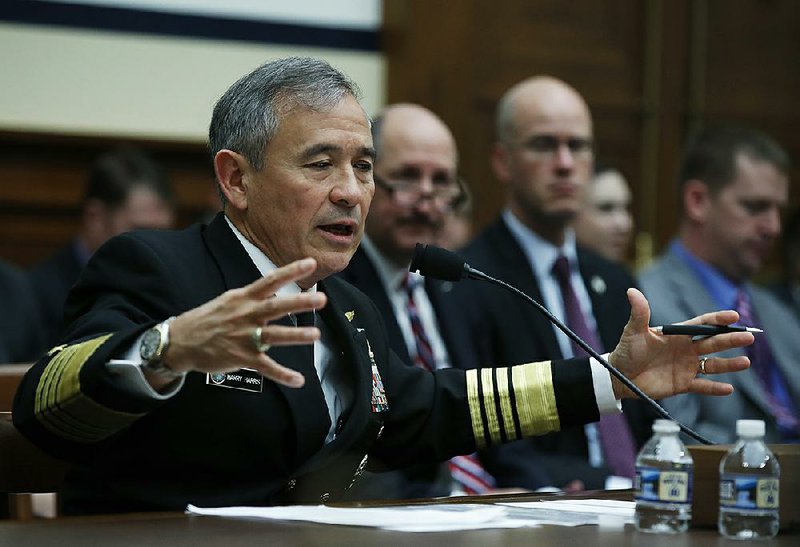WASHINGTON -- Secretary of State Rex Tillerson said Thursday that China has threatened to impose sanctions on North Korea if it conducts further nuclear tests.
"We know that China is in communications with the regime in Pyongyang," Tillerson said on Fox News Channel. "They confirmed to us that they had requested the regime conduct no further nuclear test."
Tillerson said China also told the U.S. that it had informed North Korea "that if they did conduct further nuclear tests, China would be taking sanctions actions on their own."
Earlier Thursday, the senior U.S. Navy officer overseeing military operations in the Pacific said that the crisis with North Korea is at the worst point he's ever seen, but he declined to compare the situation to the Cuban missile crisis decades ago.
"It's real," Adm. Harry Harris Jr., commander of U.S. Pacific Command, said during testimony before the Senate Armed Services Committee.
Harris said he has no doubt that North Korean leader Kim Jong Un intends to fulfill his pursuit of a nuclear-tipped missile capable of striking the United States. The admiral acknowledged there's uncertainty within U.S. intelligence agencies over how far along North Korea's nuclear and missile programs are. But Harris said it's not a matter of if but when.
"There is no doubt in my mind," Harris said.
China's Foreign Ministry had no immediate comment on Tillerson's remarks on new sanctions, but spokesman Geng Shuang said Thursday that Beijing remained committed to implementing sanctions imposed under U.N. Security Council resolutions.
"And the reason that China implements relevant resolutions is to fulfill our due international obligation rather than being pressured by any outside parties," Geng said at a daily briefing.
President Donald Trump's administration has declared that all options, including a targeted military strike, are on the table to block North Korea from carrying out threats against the United States and its allies in the region. But a pre-emptive attack isn't likely, U.S. officials have said, and the administration is pursuing a strategy of putting pressure on Pyongyang with assistance from China, North Korea's main trading partner and the country's economic lifeline.
With international support, the Trump administration said Thursday that it wants to exert a "burst" of economic and diplomatic pressure on North Korea that yields results within months to push the communist government to change course from developing nuclear weapons.
Susan Thornton, the acting top U.S. diplomat for East Asia, said there's debate about whether North Korea is willing to give up its weapons programs. She said the U.S. wants "to test that hypothesis to the maximum extent we can" for a peaceful resolution.
But Thornton said at an event hosted by the Foundation for Defense of Democracies -- a Washington think tank that has advocated tougher U.S. policies on Iran and North Korea -- that the administration treats North Korea as its primary security challenge and is serious that "all options are on the table," signaling that military action remains possible.
"We are not seeking regime change and our preference is to resolve this problem peacefully," Thornton said, "but we are not leaving anything off the table."
Trump's national security team briefed lawmakers Wednesday on North Korea's advancing nuclear capabilities that served to tamp down talk of military action as alarm rises over the North's atomic and missile testing. A joint statement from the agency heads made no specific mention of military options, though it said the U.S. would defend itself and friends.
Harris told the committee that the financial sanctions imposed against the North Korean regime by the U.S. and other countries have done nothing to slow North Korea's quest for weapons of mass destruction. He also said he's been skeptical of China's willingness to exert its influence over North Korea and persuade Pyongyang to pull back from the brink. But Harris said he's become "cautiously optimistic" after recent talks between Trump and Chinese President Xi Jinping.
"It's only been a month or so and it's too early to tell," Harris said. "I wouldn't bet my farm on it."
Harris said North Korea's pursuit of an atomic arsenal and the long-range missiles to deliver nuclear weapons comes at the expense of the North Korean people, who are isolated and forced to live with a lifeless economy.
In a show of military might, the U.S. has sent its own weaponry to the region. A group of U.S. warships led by the aircraft carrier USS Carl Vinson is in striking range of North Korea "if the president were to call on it," Harris told the committee. A U.S. missile-defense system called Terminal High-Altitude Area Defense is being installed in South Korea.
Information for this article was contributed by Matthew Pennington of The Associated Press.
A Section on 04/28/2017

